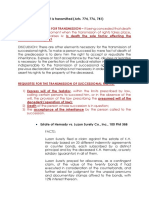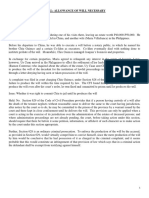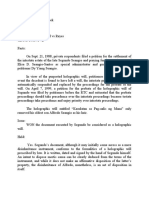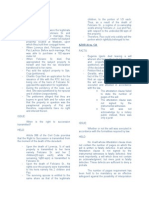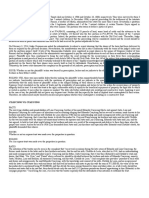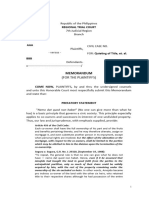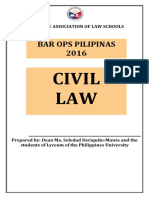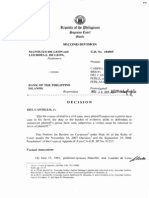Wills - 1 Digests
Wills - 1 Digests
Uploaded by
clarenceoCopyright:
Available Formats
Wills - 1 Digests
Wills - 1 Digests
Uploaded by
clarenceoOriginal Title
Copyright
Available Formats
Share this document
Did you find this document useful?
Is this content inappropriate?
Copyright:
Available Formats
Wills - 1 Digests
Wills - 1 Digests
Uploaded by
clarenceoCopyright:
Available Formats
"WAR KIDS" Laura Alvarez v. Intermediate Appellate Court, Jesus Yanes, et al.(grandchildren of the deadz sila) G.R. No.
L-68053; May 7, 1990 Facts: Aniceto was survived by his children Rufino, Felipe and Teodora. The PRs are the children of Rufino. Ani left his children lots 773 and 823. Rufino and his children left the during WW2. After liberation, they found out that lot 773 was in the possession of Santiago, Fuentebella, and Alvarez. Record shows that TCTs covering lot 773-A;B were already issued to Santiago. Santi sold the lots to Fuente. When Fuente died, his wife sold the lots to Rosendo Alvarez. PRs filed a complaint against Santi, Fuente, Alvarez, and the RD of Negros for the return of the ownership and possession of lots 773 and 823. During the pendency of the case, Alva sold the lots to Dr. Siason. Meanwhile, in 1962, Jesus executed a quitclaim in favor of defendant. However, in 1963, the CFI rendered a decision in favor of PRs.(Civil case 5022 Note: pets did not file an appeal in this dec.) Decision cannot be executed coz 733 was already registered in the name of Siason. The cadastral court initially ordered Siason to produce his TCTs. Afterwards, the court nullified its previous order coz Siason was in GF and without knowledge. The PRs filed an ex-parte motion for the issuance of an alias writ of exec. The court ruled that the judgment cannot be enforced bec. Siason was not a party in the case. Another action was filed by the PRs for the recov of the land plus damages and prutas. The pets raised res judicata, prescription and estoppel in their answer.The lower court ruled in favor of the PRs. It ruled that equity demanded that the PRs recover the actual value of the land bec. the sale was executed without court approval. The appellate court affirmed the TCs decision. MR also denied. Wills Issue: WON the obligation of deceased Alvarez(he died already) to pay the PRs could be legally transmitted and passed down to his legitimate children and heirs. Ruling: *Civil Case 5022 is already the law of the case because pets failed to file an appeal. Said decision had long become final and executory. SC is already powerless to review the decision. Yes. The binding effect of contracts upon the heirs of the deceased party is not altered by the provision of our Rules of Court that money debts of a deceased must be liquidated and paid from his estate before the residue is distributed among said heirs (Rule
89). The reason is that whatever payment is thus made from the state is ultimately a payment by the heirs or distributees, since the amount of the paid claim in fact diminishes or reduces the shares that the heirs would have been entitled to receive.( Estate of Hemady v. Luzon Surety) Petitioners being the heirs of the late Rosendo Alvarez, they cannot escape the legal consequences of their father's transaction, which gave rise to the present claim for damages. That petitioners did not inherit the property involved herein is of no moment because by legal fiction, the monetary equivalent thereof devolved into the mass of their father's hereditary estate, and we have ruled that the hereditary assets are always liable in their totality for the payment of the debts of the estate. It must, however, be made clear that petitioners are liable only to the extent of the value of their inheritance.
Octaviano, Clarence 1932
DEL MONTE Bienvenido Gevero v. Intermediate Appellate Court and Del Monte Development Corporation (DELCOR) G.R. No. 77029; August 30, 1990 Facts: DELCOR purchased a lot (lot 2476-A; 20,119 sq met) from the late Luis Lancero. As per Deed of Absolute Sale exec in favor of DELCOR, a TCT was issued. Luis acquired the same parcel of land from Ricardo Gevero(1952). The sale bet Luis and Ricardo waqs annotated at the back of an OCT covering a mother lot(lot no. 2476) in the names of Ricardo, his mother Teodorica and his siblings. Teodorica died long before WW2. In 1966, an extra-judicial settlement and partition was executed by the heirs of Teo. Lot 2476 was adjudicated in favor of Ricardo who was then alive. DELCOR filed an action with the CFI of Misamis Oriental to quiet title and/or annul the partition made by the heirs insofar as the same prejudices the land which it acquired. After trial court rendered judgment in favor of plaintiff corporation. The appellate court affirmed the decision. Wills Issue: WON the 1/2 share of interest of Teodorica in one of the litigated lots is included in the deed of sale. Ruling: Yezz. The hereditary share in a decedents' estate is transmitted or vested immediately from the moment of the death of the "causante" or predecessor in interest (Art. 777), and there is no legal bar to a successor disposing of his hereditary share immediately after such death, even if the actual extent of such share is not determined until the subsequent liquidation of the estate. Teodorica Babangha died long before World War II, hence, the rights to the succession were transmitted from the moment of her death. It is therefore incorrect to state that it was only in 1966, the date of extrajudicial partition, when Ricardo received his share in the lot as inheritance from his mother Teodorica. Thus, when Ricardo sold his share over lot 2476 that share which he inherited from Teodorica was also included unless expressly excluded in the deed of sale.
SALE IN PROBATE Natalia Opulencia v. Court of Appeals, Aladin Simundac and Miguel Olivan G.R. Mo. 125835; July 30, 1998 Facts:
PRs Aladin Simundac and Miguel Oliven filed a complaint for specific performance again Natalia Carpena Opulencia on the ground that the latter executed in their favor a 'contract to sell' of lot 2125. The defendant, despite demands, failed to comply with her obligations under the contract. The defendant averred that the property subject of the contract formed part of the Estate of Demetrio Carpena, in respect of which a petition for probate was filed with the RTC of Binan. The court ordered the parties to submit their evidence. Pet, instead of submitting evid, filed a demurrer. Moreover, the pet maintained that the contract was null and void for want of approval of the probate court. Meanwhile, the court a quo granted the demurrer and dismissed the complaint. On appeal, the appellate court set aside hte trial court's dismissal of the complaint. Issue: WON a contract to sell a real property involved in estate proceedings valid and binding without the approval of the probate court.
Ruling: Yezz naman. Hereditary rights are vested in the heir or heirs from the moment of the decedent's death. Petitioner, therefore, became the owner of her hereditary share the moment her father died. Thus, the lack of judicial approval does not invalidate the Contract to Sell, because the petitioner has the substantive right to sell the whole or a part of her share in the estate of her late father. Petitioner contends that "[t]o sanction the sale at this stage would bring about a partial distribution of the decedent's estate pending the final termination of the testate proceedings." Petitioner's contention is not convincing. The Contract to Sell stipulates that petitioner's offer to sell is contingent on the "complete clearance of the court on the Last Will Testament of her father." Consequently, although the Contract to Sell was perfected between the petitioner and private respondents during the pendency of the probate proceedings, the consummation of the sale or the transfer of ownership over the parcel of land to the private respondents is subject to the full payment of the purchase price and to the termination and outcome of the testate proceedings. Therefore, there is no basis for petitioner's apprehension that the Contract to Sell may result in a premature partition and distribution of the properties of the estate. Indeed, it is settled that "the sale made by an heir of his share in an inheritance, subject to the pending administration, in no wise stands in the way of such administration."
Octaviano, Clarence 1932
FISHING PARTNERSHIP Emilio Emnace v. Court of Appeals and the Estate of Vicente Tabanao (plus heirs) G.R. No. 126334; November 23, 2001 Facts: Pets Emnace, Tabanao and Divigranacia were partners in a business known as Ma. Nelma Fishing Industry. Sometime in January 1986, they decided to dissolve their partnership and exec an agreement of partition and distribution. Throughout the existence of the partnership, and even after Tabanao's death, pet failed to submit to Taba's heirs any financial statements. Pet also reneged on his promise to turn over the 1/3 share in the total assets of the partnership to the heirs. PRs(heris) filed an action for accounting, payment of shares, division of assets and damages. Pet filed a motion to dismiss the complaint on the grounds of improp venue, lack of juris and lack of capacity of the estate of Tabano to sue. The trial court denied the motion to dismiss. The trial court held that the heirs of Tabano had a right to sue in their own names, in view of the provision of Art. 777 of the CC. Issue: Legal capacity of the surviving spouse of Tabano to sue. Ruling: Yezz naman. petitioner asserts that the surviving spouse of Vicente Tabanao has no legal capacity to sue since she was never appointed as administratrix or executrix of his estate. Petitioners objection in this regard is misplaced. The surviving spouse does not need to be appointed as executrix or administratrix of the estate before she can file the action. She and her children are complainants in their own right as successors of Vicente Tabanao. From the very moment of Vicente Tabanaos death, his rights insofar as the partnership was concerned were transmitted to his heirs, for rights to the succession are transmitted from the moment of death of the decedent. Whatever claims and rights Vicente Tabanao had against the partnership and petitioner were transmitted to respondents by operation of law, more particularly by succession, which is a mode of acquisition by virtue of which the property, rights and obligations to the extent of the value of the inheritance of a person are transmitted. Moreover, respondents became owners of their respective hereditary shares from the moment Vicente Tabanao died. A prior settlement of the estate, or even the appointment of Salvacion Tabanao as executrix or administratrix, is not necessary for any of the heirs to acquire legal capacity to sue. As successors who stepped into the shoes of their decedent upon his death, they can
commence any action originally pertaining to the decedent. From the moment of his death, his rights as a partner and to demand fulfillment of petitioners obligations as outlined in their dissolution agreement were transmitted to respondents. They, therefore, had the capacity to sue and seek the courts intervention to compel petitioner to fulfill his obligations.
Belinda Taredo v. Court of Appeals G.R. No. 104482; January 22, 1996 Facts: On October 20, 1962, Lazardo Tanedo executed a notarized deed of absolute sale of one hectare of whatever share I shall have over Lot No. 191" in favor of his eldest brother and his wife (Ricardo and Teresita PRs). Upon hte death of his father, Lazaro executed an "Affidavit of Conformity" to reaffirm, respect and acknowledge the sale in favor or PRs. Lazaro executed another notarized deed of sale on favor of PRs covering 1/12 of a Lot 191. Ricardo learned taht Lazaro sold the same lot to his children. PRs recorded the deed in the RD. Pets filed a complaint for rescission executed by Lazaro in favor of the PRs. The trial court decided in favor of PRs. The CA affirmed the decision of the trial court. Issue: WON the sale of future inheritance is valid. Ruling: Yez syempre duh! Read Art. 1347.. A second deed of sale was executed in favor of private respondents covering Lazaro's undivided inheritance dated 1982, so nevermind the previous deed ya know. The deed of sale in favor of respondents was executed in 1980. However, according to Art. 1544 of the CC: Art. 1544. If the same thing should have been sold to different vendees, the ownership shall be transferred to the person who may have first taken possession thereof in good faith, if it should be movable property. Should it be immovable property, the ownership shall belong to the person acquiring it who in good faith first recorded it in the Registry of Property. The property in question is land, an immovable, and following the above-quoted law, ownership shall belong to the buyer who in good faith registers it first in the registry of property. Thus, although the deed of sale in favor of private respondents was later than the one in favor of petitioners, ownership would vest in the former because of the undisputed fact of registration. On the other hand, petitioners have not registered the sale to them at all.
Octaviano, Clarence 1932
BICOLANONG HACIENDERO Mariano B. Locsin v. Court of Appeals G.R. No. 89783; February 19, 1992 Facts: Mariano inherited extensive property from his father Getulio. He brought his inheritance into his marriage with Catalina Jaucian. Catalina, for her part, brought into the marriage untitled properties which she had inherited form her parents. Mariano Locsin executed a last will and testament instituting his wife as the sole and universal heir of all his properties. The spouses being childless, they had agreed that their properties, after both of them shall have died should revert to their respective sides of the family. After Mariano's death, (1948) his will was probated without opposition from both sides of the family. Nine years after the death of Don Mariano, Catalina began transferring, by sale, donation or assignment, Mariano's as well as her own, props to their respective nephews and nieces. Catalina died in 1977. Four years before her death, she made a will affirming the transfers she made. Six years after her demise, some of Catalina's nephews and nieces filed an action in the RTC of Legaspi to recover the properties which she had conveyed to the Locsins, alleging that the conveyances were innoficious, without consideration, and intended solely to circumvent the laws on succession. After the trial, judgment was rendered in favor of the plaintiffs. The Court of Appeals affirmed the trial court's decision. Issue: WON the PRs are entitled to inherit the properties which Catalina had already disposed of more than 10 yrs before her death. Ruling: No. The properties did not form part of her hereditaty estate. The rights to a person's succession are transmitted from the moment of his death, and do not vest in his heirs until such time. 11 Property which Doa Catalina had transferred or conveyed to other persons during her lifetime no longer formed part of her estate at the time of her death to which her heirs may lay claim. Had she died intestate, only the property that remained in her estate at the time of her death devolved to her legal heirs; and even if those transfers were, one and all, treated as donations, the right arising under certain circumstances to impugn and compel the reduction or revocation of a decedent's gifts inter vivos does not inure to the respondents since neither they nor the donees are compulsory (or forced) heirs. There is thus no basis for assuming an intention on the part of Doa Catalina, in transferring the properties she had received from her late husband to his nephews and
nieces, an intent to circumvent the law in violation of the private respondents' rights to her succession. Said respondents are not her compulsory heirs, and it is not pretended that she had any such, hence there were no legitimes that could conceivably be impaired by any transfer of her property during her lifetime. All that the respondents had was an expectancy that in nowise restricted her freedom to dispose of even her entire estate subject only to the limitation set forth in Art. 750, Civil Code which, even if it were breached, the respondents may not invoke.
Octaviano, Clarence 1932
CODICIL Johny Rabadilla v. Court of Appeals G.R. No, 113725; June 29, 2000 Facts: Testator Aleja Belleza appended a codicil to his last will and testament wherein he instituted Dr. Jorge Rabadilla as a devisee of 511, 855 sq meters of a parcel of land in Bacolod. Devisee herein is the predecessor-in-interest of the petitioner. The codicil was duly probated and admitted before the CFI of Negros Occidental. The codicil stated that should the devisee die ahead of the testator, the property and rights shall be inherited by his children and spouse. The codicil also required Rabadilla to deliver 75 piculs of export sugar and 25 piculs of domestic sugar to Maria Marlina Cosculuella y Belleza, and should he die, his heir shall have the same obligation. Lastly, in the event that the devisee or his heir shall later sell, lease, mortgage the said lot, the buyer, lessee, mortgagee shall also have the obligation to deliver the piculs. Dr. Rabadilla died in 1983 and was survived by his wife and children (pet). In 1989, Maria Marlena brought a complaint against the heirs to enforce the provisions of the codicil and to revert the ownership to the heirs of the testator. The RTC dismissed the complaint. The appellate court reversed the decision of the trial court.. Ruling: Yes. Petitioner maintains that Article 882 does not find application as there was no modal institution and the testatrix intended a mere simple substitution. Under Article 776 of the New Civil Code, inheritance includes all the property, rights and obligations of a person, not extinguished by his death. Conformably, whatever rights Dr. Jorge Rabadilla had by virtue of subject Codicil were transmitted to his forced heirs, at the time of his death. And since obligations not extinguished by death also form part of the estate of the decedent; corollarily, the obligations imposed by the Codicil on the deceased Dr. Jorge Rabadilla, were likewise transmitted to his compulsory heirs upon his death. In the said Codicil, testatrix Aleja Belleza devised Lot No. 1392 to Dr. Jorge Rabadilla, subject to the condition that the usufruct thereof would be delivered to the herein private respondent every year. Upon the death of Dr. Jorge Rabadilla, his compulsory heirs succeeded to his rights and title over the said property, and they also assumed his (decedent's) obligation to deliver the fruits of the lot involved to herein private respondent. Such obligation of the instituted heir reciprocally corresponds to the right of private respondent over the usufruct, the fulfillment or performance of which is now being demanded by the latter through the institution of the case at bar. Therefore, private
respondent has a cause of action against petitioner and the trial court erred in dismissing the complaint below.
Modal Institutions::*Petitioner also theorizes that Article 882 of the New Civil Code on modal institutions is not applicable because what the testatrix intended was a substitution - the contention is without merit. In simple substitutions, the second heir takes the inheritance in default of the first heir by reason of incapacity, predecease or renunciation. [14] In the case under consideration, the provisions of subject Codicil do not provide that should Dr. Jorge Rabadilla default due to predecease, incapacity or renunciation, the testatrix's near descendants would substitute him. What the Codicil provides is that, should Dr. Jorge Rabadilla or his heirs not fulfill the conditions imposed in the Codicil, the property referred to shall be seized and turned over to the testatrix's near descendants.
Octaviano, Clarence 1932
BILIHAN NG LUPA Sps Virgilio Santos and Esperanza Lati Santos v. Sps. Jose Lumbao and Proserfina Lumbao; G.R. No. 169129; March 28, 2007 Facts: Herein pets are the legitimate and surviving heirs of the late Rita Catoc Santos, who died on October 20, 195. The other pets are the daughters-in-law of Rita. The respondents are the alleged owners of a lot, which they purportedly bought from on two occasions. On the first occasion, Rita sold 100 square meters of her inchoate share in her mothers estate through a document denominated as "Bilihan ng Lupa, Before her death, Rita allegedly informed the respondents that she could not deliver the title to the subject prop because the entire property inherited by her had not yet been partitioned. The PRs claimed that pets adjudicated and partitioned the subject property already sold to them. They filed a formal demand letter but pets still failed and refused to reconvey the subject property. The trial court denied the complaint. The CA reversed the decision. MR denied. Issue: WON herein pets are legally bound to comply with the "Bilihan ng Lupa" and consequently, reconvey the subject property to herein respondents. Ruling: The general rule that heirs are bound by contracts entered into by their predecessors-ininterest applies in the present case. Article 131132 of the NCC is the basis of this rule. It is clear from the said provision that whatever rights and obligations the decedent have over the property were transmitted to the heirs by way of succession, a mode of acquiring the property, rights and obligations of the decedent to the extent of the value of the inheritance of the heirs. Thus, the heirs cannot escape the legal consequence of a transaction entered into by their predecessor-in-interest because they have inherited the property subject to the liability affecting their common ancestor. Being heirs, there is privity of interest between them and their deceased mother. They only succeed to what rights their mother had and what is valid and binding against her is also valid and binding as against them. The death of a party does not excuse nonperformance of a contract which involves a property right and the rights and obligations thereunder pass to the personal representatives of the deceased. Similarly, nonperformance is not excused by the death of the party when the other party has a property interest in the subject matter of the contract. In the end, despite the death of the petitioners mother, they are still bound to comply with the provisions of the "Bilihan ng Lupa,".
SINUMPAANG SALAYSAY NHA v. Segunda Almeida, CA G.R. No. 162784; June 22, 2007 Facts: The Land Tenure Administration awarded to Margarita Herrera several portions of land in San Pedro, Laguna. She had two children, Francisca and Beatriz(she died before her mom; mother of PR). When Margarita passed away, Francisca executed a deed of selfadjudication claiming that she was the only remaining relative of Margarita. The deed of was based on a 'Sinumpaang Salaysay' allegedly executed by Margarita. The surviving heirs of Beatriz filed a case for annulment of the deed. A decision was rendered and the deed was declared null and void. During the trial, Francisca filed an application with the NHA to purchase the same lots. The NHA granted the application. The PR appealed to the Office of the President. The NHA reso was affirmed. When Francisca died, her heirs executed an extrajudicial settlement of her estate which they submitted to the NHA. The transfer of rights was approved by the NHA. The heirs of Francisca directed PR to leave the premises that she was occupying. Feeling aggrieved, PR sought the cancellation of the titles issued in favor of the heirs of Francisca. She filed a complaint in the RTC of San Pedro, Laguna. She invoked her 40 year occupation of the property and re-raised the fact that Francisca's declaration is a nullity because the other heirs were disregarded. The RTC dismissed the case for lack of jurisdiction. The CA reversed the decision and remanded the case for further hearing. The RTC rendered a decision setting aside the resolution of the NHA and the decision of the Office of the President. The Regional Trial Court ruled that the "Sinumpaang Salaysay" was not an assignment of rights but a disposition of property which shall take effect upon death. It then held that the said document must first be submitted to probate before it can transfer property. The NHA and the heirs of Francisca filed their respective motions which were both denied. The CA affirmed the decision of the trial court.
Issue: WON the decision of NHA is arbitrary.
Ruling: Yes. The NHA gave due course to the application made by Francisca Herrera without considering that the initial applicant's death would transfer all her property, rights and
Octaviano, Clarence 1932
obligations to the estate including whatever interest she has or may have had over the disputed properties. To the extent of the interest that the original owner had over the property, the same should go to her estate. Margarita Herrera had an interest in the property and that interest should go to her estate upon her demise so as to be able to properly distribute them later to her heirsin accordance with a will or by operation of law. When the original buyer died, the NHA should have considered the estate of the decedent as the next "person" likely to stand in to fulfill the obligation to pay the rest of the purchase price. The opposition of other heirs to the repurchase by Francisca Herrera should have put the NHA on guard as to the award of the lots. Further, the Decision in the said Civil Case No. B-1263 (questioning the Deed of Self-Adjudication) which rendered the deed therein null and void should have alerted the NHA that there are other heirs to the interests and properties of the decedent who may claim the property after a testate or intestate proceeding is concluded. The NHA therefore acted arbitrarily in the award of the lots.
Octaviano, Clarence 1932
You might also like
- Specpro Case DigestsDocument96 pagesSpecpro Case DigestsMary CambelNo ratings yet
- Succession Reviewer Case DigestsDocument56 pagesSuccession Reviewer Case DigestsMonice Rivera100% (3)
- Wills 4F 2015 2016Document97 pagesWills 4F 2015 2016GelaiNo ratings yet
- Succession Cases MidtermDocument35 pagesSuccession Cases MidtermIrish D DagmilNo ratings yet
- Arrazola Vs BernasDocument4 pagesArrazola Vs BernasChaNo ratings yet
- Case Digest CompilationDocument18 pagesCase Digest CompilationakosivansotNo ratings yet
- Acap Vs CADocument20 pagesAcap Vs CAJohnday MartirezNo ratings yet
- II. Extrajudicial Settlement - Cases - RamosDocument5 pagesII. Extrajudicial Settlement - Cases - Ramosmonica may ramosNo ratings yet
- ATP No. 86-92 Case DigestsDocument9 pagesATP No. 86-92 Case DigestsKenneth AvalonNo ratings yet
- WenDocument5 pagesWenKetaks MooNo ratings yet
- O o o O: Alvarez Vs IAC (1990) FactsDocument2 pagesO o o O: Alvarez Vs IAC (1990) FactsNN DDLNo ratings yet
- Case Digest For Law On PropertyDocument3 pagesCase Digest For Law On PropertyJohn Charel Sabandal PongaseNo ratings yet
- Property 7th WeekDocument12 pagesProperty 7th WeekRalph232323No ratings yet
- Will DgestsDocument23 pagesWill DgestsLarissaNo ratings yet
- Zach 1 (Preterition-Inofficious Donations)Document8 pagesZach 1 (Preterition-Inofficious Donations)Zachary BañezNo ratings yet
- QUESTION: ELEMENTS FOR TRANSMISSION - It Being Conceded That DeathDocument19 pagesQUESTION: ELEMENTS FOR TRANSMISSION - It Being Conceded That DeathKen LimNo ratings yet
- Vda de Esconde Vs CA DigestDocument1 pageVda de Esconde Vs CA DigestshamymyNo ratings yet
- Probate Mandatory: Rule 75 Production of Will: Allowance of Will NecessaryDocument22 pagesProbate Mandatory: Rule 75 Production of Will: Allowance of Will NecessaryJumel John H. ValeroNo ratings yet
- Complete Digest-Wills & SuccessionDocument54 pagesComplete Digest-Wills & Successionmay_aliliNo ratings yet
- Legal Technique Cases Digest Succession 2017 2018Document11 pagesLegal Technique Cases Digest Succession 2017 2018Ronellie Marie TinajaNo ratings yet
- 2 Villanueva vs. BranocoDocument9 pages2 Villanueva vs. BranocoKaye Miranda LaurenteNo ratings yet
- Alvarez v. IACDocument3 pagesAlvarez v. IACJustin MoretoNo ratings yet
- Fifth Week Case DigestsDocument37 pagesFifth Week Case DigestsKhun The GreatNo ratings yet
- Taxation 2 Compiled Cases EditedDocument83 pagesTaxation 2 Compiled Cases EditedRvic CivrNo ratings yet
- Succession Case DoctrinesDocument30 pagesSuccession Case DoctrinesTrisha PizarroNo ratings yet
- Succession Cases Week 1Document40 pagesSuccession Cases Week 1Yeyen M. EvoraNo ratings yet
- Cases WillsDocument23 pagesCases WillsBelle CaldeaNo ratings yet
- Coja vs. CaDocument3 pagesCoja vs. CaChelsea GarciaNo ratings yet
- 1 Acap vs. Court of Appeals, 66 Scad 359, 251 Scra 30 (1995) .Document4 pages1 Acap vs. Court of Appeals, 66 Scad 359, 251 Scra 30 (1995) .Robert EspinaNo ratings yet
- Assignment 2 CompilationDocument53 pagesAssignment 2 CompilationSaline EscobarNo ratings yet
- Alcantara-Daus V. Spouses de LeonDocument34 pagesAlcantara-Daus V. Spouses de Leoncris baligodNo ratings yet
- Heirs of William Sevilla vs. Sevilla G.R. No. 150179 April 30, 2003Document40 pagesHeirs of William Sevilla vs. Sevilla G.R. No. 150179 April 30, 2003misseixihNo ratings yet
- Succession - TAMONDONGDocument8 pagesSuccession - TAMONDONGrommel tamondongNo ratings yet
- Succession - DigestDocument237 pagesSuccession - DigestArianeNo ratings yet
- Compilation of DigestSALESDocument7 pagesCompilation of DigestSALESjetzon2022No ratings yet
- Special ProceedingsDocument13 pagesSpecial Proceedingskarla126100% (1)
- 2nd CASE DIGESTS - SUXDocument62 pages2nd CASE DIGESTS - SUXJeffrey JosolNo ratings yet
- Acap v. CADocument9 pagesAcap v. CAKate DomingoNo ratings yet
- Imperial Vs CA DigestDocument3 pagesImperial Vs CA DigestNika RojasNo ratings yet
- Petitioner vs. vs. Respondents: Second DivisionDocument7 pagesPetitioner vs. vs. Respondents: Second DivisionCeline GarciaNo ratings yet
- INC.-LASTNAME Property Arts485-559Document81 pagesINC.-LASTNAME Property Arts485-559SALMAN JOHAYRNo ratings yet
- Co-Ownership Case DigestDocument7 pagesCo-Ownership Case DigestCalagui Tejano Glenda JaygeeNo ratings yet
- LTD - Hiezll RiveraDocument41 pagesLTD - Hiezll RiveraHiezll Wynn R. RiveraNo ratings yet
- Imperial vs. Court of Appeals G.R. 112483 On Collation and PrescriptionDocument17 pagesImperial vs. Court of Appeals G.R. 112483 On Collation and PrescriptionVenus Amelie MejiaNo ratings yet
- Implied and Express TrustDocument7 pagesImplied and Express TrustmarkNo ratings yet
- Trust - Final Case DigestsDocument5 pagesTrust - Final Case DigestsDyan Corpuz-SurescaNo ratings yet
- Alvarez V YanesDocument2 pagesAlvarez V YanesNic NalpenNo ratings yet
- Memorandum Quieting of Title RedactedDocument36 pagesMemorandum Quieting of Title RedactedKaye ArendainNo ratings yet
- Imperial v. Court of Appeals 316 SCRA 393 - DigestDocument4 pagesImperial v. Court of Appeals 316 SCRA 393 - DigestErrol DobreaNo ratings yet
- Goñi v. CA, VicenteDocument3 pagesGoñi v. CA, VicentestephendanieljavierNo ratings yet
- Compiled Case Digest in SuccessionDocument76 pagesCompiled Case Digest in SuccessionPinky Marie Paroligan-MagaoayNo ratings yet
- Quieting of Title Cases Property LawDocument6 pagesQuieting of Title Cases Property LawEllen Glae Daquipil100% (1)
- Buebos Vs People GR 163938 Mar 28 2008Document37 pagesBuebos Vs People GR 163938 Mar 28 2008Kim ArizalaNo ratings yet
- PALS Civil Law 2016 PDFDocument9 pagesPALS Civil Law 2016 PDFJona AddatuNo ratings yet
- PALS Civil Law 2016Document9 pagesPALS Civil Law 2016FrancisRegachueloNo ratings yet
- ATP Adaza To BritoDocument7 pagesATP Adaza To BritoorteadmNo ratings yet
- Sux Cont 2 CASE DIGESTSDocument3 pagesSux Cont 2 CASE DIGESTSFlowerHornsNo ratings yet
- Report of the Decision of the Supreme Court of the United States, and the Opinions of the Judges Thereof, in the Case of Dred Scott versus John F.A. Sandford December Term, 1856.From EverandReport of the Decision of the Supreme Court of the United States, and the Opinions of the Judges Thereof, in the Case of Dred Scott versus John F.A. Sandford December Term, 1856.No ratings yet
- Wills Law and Contests: Writing a Valid Will, Trust Administration, and Trust Fiduciary DutyFrom EverandWills Law and Contests: Writing a Valid Will, Trust Administration, and Trust Fiduciary DutyRating: 2 out of 5 stars2/5 (1)
- History of Inheritance Law: Everything You Need to KnowFrom EverandHistory of Inheritance Law: Everything You Need to KnowNo ratings yet
- Accountability of Public OfficersDocument123 pagesAccountability of Public OfficersclarenceoNo ratings yet
- Bill of Rights 1Document100 pagesBill of Rights 1clarenceoNo ratings yet
- Division of LegitimeDocument3 pagesDivision of LegitimeclarenceoNo ratings yet
- Wills - 3 DigestDocument19 pagesWills - 3 DigestclarenceoNo ratings yet
- Wills - 2 DigestDocument11 pagesWills - 2 Digestclarenceo100% (1)
- Crim Pro DigestsDocument17 pagesCrim Pro DigestsclarenceoNo ratings yet
- Law As An Interpretive ConceptDocument280 pagesLaw As An Interpretive ConceptharkaosiewmaiNo ratings yet
- HFA v. Trinidad/Bentham - R&R On MSJ (Noninfringement)Document10 pagesHFA v. Trinidad/Bentham - R&R On MSJ (Noninfringement)Sarah BursteinNo ratings yet
- Barrio v. Condado SuitDocument26 pagesBarrio v. Condado SuitWKYC.comNo ratings yet
- BidyaDocument3 pagesBidyaAbhishek VermaNo ratings yet
- #2 Republic vs. Dela Cruz 1975Document2 pages#2 Republic vs. Dela Cruz 1975iicaiiNo ratings yet
- William Murray v. Commonwealth of Pennsylvania, Re: Albert A. Fiok, Judge of Court Oyer and Terminer, Allegheny County, Pennsylvania, 408 F.2d 498, 3rd Cir. (1969)Document2 pagesWilliam Murray v. Commonwealth of Pennsylvania, Re: Albert A. Fiok, Judge of Court Oyer and Terminer, Allegheny County, Pennsylvania, 408 F.2d 498, 3rd Cir. (1969)Scribd Government DocsNo ratings yet
- L/Epubltc Tue Lluiltpptnes: QcourtDocument11 pagesL/Epubltc Tue Lluiltpptnes: QcourtThe Supreme Court Public Information OfficeNo ratings yet
- Lawsuit Filed in Detroit Federal Court Over 'Frozen'Document14 pagesLawsuit Filed in Detroit Federal Court Over 'Frozen'David KomerNo ratings yet
- Frabelle Fishing Corporation VsDocument3 pagesFrabelle Fishing Corporation VsnabingNo ratings yet
- GIBSON v. BOY SCOUTS OF AMERICA Et Al - Document No. 6Document4 pagesGIBSON v. BOY SCOUTS OF AMERICA Et Al - Document No. 6Justia.comNo ratings yet
- Alwin E. Hopfmann v. Michael Joseph Connolly, 769 F.2d 24, 1st Cir. (1985)Document3 pagesAlwin E. Hopfmann v. Michael Joseph Connolly, 769 F.2d 24, 1st Cir. (1985)Scribd Government DocsNo ratings yet
- William Noe Perez-Cortez, A205 383 123 (BIA Sept. 25, 2013)Document4 pagesWilliam Noe Perez-Cortez, A205 383 123 (BIA Sept. 25, 2013)Immigrant & Refugee Appellate Center, LLCNo ratings yet
- Ruperto Suldao V Cimech SystemDocument7 pagesRuperto Suldao V Cimech SystemMervic Al Tuble-NialaNo ratings yet
- Rural Bank of Lipa City Vs CA Case DigestDocument5 pagesRural Bank of Lipa City Vs CA Case DigestBerch Melendez100% (1)
- People Vs SobrepenaDocument3 pagesPeople Vs SobrepenakaiaceegeesNo ratings yet
- Consti1 Outline ADBautista (1st Semester SY 2006 2007)Document16 pagesConsti1 Outline ADBautista (1st Semester SY 2006 2007)lex libertadore100% (1)
- August 6 NATDocument65 pagesAugust 6 NATMahad AliNo ratings yet
- EvidenceDocument13 pagesEvidenceRex FloresNo ratings yet
- G.R. No. 158298Document2 pagesG.R. No. 158298Noel Christopher G. BellezaNo ratings yet
- Robin Construction Company, A Corporation of New Jersey, Richard D. Masia and Judith Masia v. United States, 345 F.2d 610, 3rd Cir. (1965)Document9 pagesRobin Construction Company, A Corporation of New Jersey, Richard D. Masia and Judith Masia v. United States, 345 F.2d 610, 3rd Cir. (1965)Scribd Government DocsNo ratings yet
- SeaWorld Vs OSHA - SeaWorld Reply Brief To Dept of Labor Brief - US Court of Appeals Washington DCDocument38 pagesSeaWorld Vs OSHA - SeaWorld Reply Brief To Dept of Labor Brief - US Court of Appeals Washington DCThe Orca Project Corp100% (1)
- Doctrine of Prospective Overruling and Its Significance: A Jurisprudential AnalysisDocument13 pagesDoctrine of Prospective Overruling and Its Significance: A Jurisprudential AnalysisAnantHimanshuEkkaNo ratings yet
- Regional Trial Courts: Master List of Incumbent JudgesDocument26 pagesRegional Trial Courts: Master List of Incumbent JudgesFrance De LunaNo ratings yet
- 2019 MLD 328 (Deletion of 7ATA Before Taking CognizanceDocument3 pages2019 MLD 328 (Deletion of 7ATA Before Taking CognizanceRana Shaukat AliNo ratings yet
- Times Leader 05-03-2012Document40 pagesTimes Leader 05-03-2012The Times LeaderNo ratings yet
- Federal Habeas Corpus Petition 28 U S C 2254Document19 pagesFederal Habeas Corpus Petition 28 U S C 2254Janeth Mejia Bautista AlvarezNo ratings yet
- Catholic Vicar vs. CADocument5 pagesCatholic Vicar vs. CAAnonymous oDPxEkdNo ratings yet
- Supreme Court of India Page 1 of 5Document5 pagesSupreme Court of India Page 1 of 5lathacoolNo ratings yet
- 7 Felizardo Vs CADocument8 pages7 Felizardo Vs CApkdg1995No ratings yet
- CIR Vs San Roque Power DigestDocument27 pagesCIR Vs San Roque Power DigestDeb Bie50% (2)















